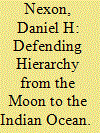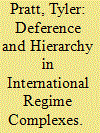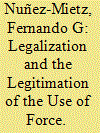|
|
|
Sort Order |
|
|
|
Items / Page
|
|
|
|
|
|
|
| Srl | Item |
| 1 |
ID:
160509


|
|
|
|
|
| Summary/Abstract |
I consider a model in which two states choose how much to arm and whether to attack in successive periods. Arms are useful not only for deterrence or taking territory, but also because they influence the resolution of a set of disputed issues. States can cooperate on the issues by limiting military competition, but only as far as an endogenous “war constraint” allows. Factors determining the tightness of the war constraint imply hypotheses about the international determinants of military effort and thus the costs of anarchy. The strategic logic differs from standard security-dilemma arguments, in which the costs of anarchy are associated with conflict between status quo states that are uncertain about others' territorial revisionism. Here, inefficiency arises because arming to deter lowers a state's value for living with the status quo, which creates a security externality and a feedback loop. The model both synthesizes and revises a range of theoretical arguments about the determinants of interstate cooperation and conflict.
|
|
|
|
|
|
|
|
|
|
|
|
|
|
|
|
| 2 |
ID:
160511


|
|
|
|
|
| Summary/Abstract |
Why do leading actors invest in costly projects that they expect will not yield appreciable military or economic benefits? We identify a causal process in which concerns about legitimacy produce attempts to secure dominance in arenas of high symbolic value by investing wealth and labor into unproductive (in direct military and economic terms) goods and performances. We provide evidence for our claims through a comparative study of the American Project Apollo and the Ming Dynasty's treasure fleets. We locate our argument within a broader constructivist and practice-theoretic understanding of hierarchy and hegemony. We build on claims that world politics is a sphere of complex social stratification by viewing constituent hierarchies in terms of social fields. Our specific theory and broader framework, we contend, provide tools for understanding the workings of power politics beyond military and economic competition.
|
|
|
|
|
|
|
|
|
|
|
|
|
|
|
|
| 3 |
ID:
160510


|
|
|
|
|
| Summary/Abstract |
How do states resolve jurisdictional conflicts among international institutions? In many issue areas, global governance is increasingly fragmented among multiple international organizations (IOs). Existing work argues this fragmentation can undermine cooperation as different institutions adopt conflicting rules. However, this perspective overlooks the potential for interinstitutional coordination. I develop a theory of institutional deference: the acceptance of another IO's exercise of authority. By accepting rules crafted in another IO, member states can mitigate rule conflict and facilitate a division of labor within the regime complex. I use an original data set of over 2,000 IO policy documents to describe patterns of deference in the counterterrorism, intellectual property, and election-monitoring regime complexes. Empirical tests support two theoretical claims. First, institutional deference is indeed associated with a division of labor among institutions: IOs that defer to each other are more likely to focus their rule-making efforts on separate subissues. Second, deference is a strategic act that is shaped both by efficiency concerns and power politics. Statistical tests confirm that deference is used to efficiently pool resources among disparate organizations, and that IOs with weaker member states tend to defer to organizations with more powerful members.
|
|
|
|
|
|
|
|
|
|
|
|
|
|
|
|
| 4 |
ID:
160514


|
|
|
|
|
| Summary/Abstract |
Politicians frequently turn to reputational arguments to bolster support for their proposed foreign policies. Yet despite the prevailing belief that domestic audiences care about reputation, there is very little direct evidence that publics care about reputation costs, and very little understanding of how. We propose a dispositional theory of reputation costs in which citizens facing ill-defined strategic situations turn to their core predispositions about foreign affairs in order to weigh competing reputational dimensions. Employing a diverse array of methodological tools—from vignette-based survey experiments to automated text analysis—we show that the mass public has a “taste” for reputation, but understands it in fundamentally different ways, with hawks concerned about the negative reputational consequences of inconsistency, and doves equally concerned with the negative reputational consequences of belligerence and interventionism. In illustrating how reputation costs are in our heads, our findings offer both good and bad news for theories of reputation in IR.
|
|
|
|
|
|
|
|
|
|
|
|
|
|
|
|
| 5 |
ID:
160515


|
|
|
|
|
| Summary/Abstract |
Recent works on the role of argumentation in international politics have enriched our understanding of the discursive construction of international legitimacy. Many scholars have recognized the pervasiveness and privileged status of legal claims. Building on these insights, I advance the proposition that the international legitimacy of the use of force has legalized. Legalization implies that successful (de-)legitimation depends on the strategic use of international law, and that alternative legitimacy discourses (such as morality) have been marginalized and play a negligible role in the construction of legitimacy. Thus, the use of force is legitimate to the extent that it conforms to international law. I test this “legalization thesis” against the “hard” case of NATO's intervention in Kosovo in 1999. By revisiting the arguments used by state representatives, I show that, as expected in a legalized legitimacy system and contrary to what has become common knowledge about this case, legitimacy was gained through, not despite, international law. I analyze NATO's strategy of legitimation in detail and reconstruct it as a set of seven strategic moves, all of them appealing exclusively to the international legal discourse.
|
|
|
|
|
|
|
|
|
|
|
|
|
|
|
|
| 6 |
ID:
160512


|
|
|
|
|
| Summary/Abstract |
How does publicizing states' illicit activities affect the stability of international order? What does this relationship tell us about how governments react to violations of international rules? In contrast to the conventional wisdom that transparent monitoring strengthens the normative legal order, we argue that these activities often undermine it. We develop two mechanisms through which this occurs: by raising the known rate of noncompliance, and by sharpening the threat that deviance poses to other states. We argue that when enforcers understand the dangers of publicizing transgressions, they do so selectively. Focusing on the nuclear nonproliferation domain, we demonstrate that these concerns shaped American decisions to reveal or obfuscate other states' efforts to obtain nuclear weapons. We formalize this argument and then empirically test the model's predictions using in-depth case study analyses. We find that the US failed to disclose infractions when this publicity would have undermined the rules through the two mechanisms we identify. However, while concealing violations can prevent proliferation in response to specific nuclear programs, it can also create potential dangers to a regime's overall health and stability. In addition to reassessing a widely shared assumption about the value of transparent monitoring, this article's broad theoretical framework can shed light on enforcement and compliance dynamics in a variety of international settings.
|
|
|
|
|
|
|
|
|
|
|
|
|
|
|
|
| 7 |
ID:
160513


|
|
|
|
|
| Summary/Abstract |
Prior research has sought to understand the rise of election observers and their consequences for outcomes such as fraud, protest, and violence. These studies are important but they overlook a significant individual-level dynamic that observers themselves care about: the effect that election observers have on local attitudes about elections. We argue that the activities of election observers can enhance elections' local credibility, but only when locals perceive observers as being both capable of detecting fraud and unbiased in that pursuit. Not all observer groups are seen as equally capable and unbiased. Evidence from a large-scale, nationally representative experiment in Tunisia supports the argument. A key finding is that observers from the Arab League—an organization criticized internationally for low-quality election observation—enhanced credibility the most because they were perceived locally as both relatively capable and unbiased.
|
|
|
|
|
|
|
|
|
|
|
|
|
|
|
|
|
|
|
|
|